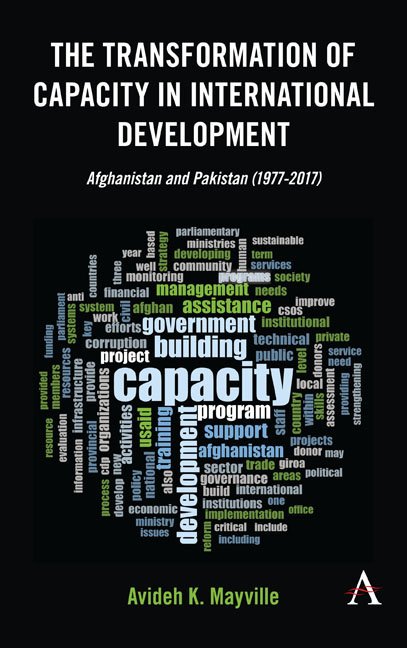Book contents
- Frontmatter
- Dedication
- Contents
- List of Figures
- Acknowledgments
- Chapter One Introduction
- Chapter Two Development Agendas and Donor Spaces: How Capacity Gained Salience
- Chapter Three Capacity in Development Policy and Practice: The Quest for Performance Excellence in the Governance of Disabling Environments
- Chapter Four Capacity and Fragility: The Sociological Framework for the Capacity Project and Developing “Fragile” States
- Chapter Five The Capacity Project in “AfPak”: Development Experiments, Subnational Spaces, and Transnational Networks
- Chapter Six The Battle for Power in Disabling Environments: Statecraft and Developing Capacity in Afghanistan and Pakistan
- Chapter Seven Developing Capacity to Manage Global Threats: Statemaking, the Militarization of Development, and Human Rights Approaches
- References
- Index
Chapter Three - Capacity in Development Policy and Practice: The Quest for Performance Excellence in the Governance of Disabling Environments
Published online by Cambridge University Press: 11 December 2019
- Frontmatter
- Dedication
- Contents
- List of Figures
- Acknowledgments
- Chapter One Introduction
- Chapter Two Development Agendas and Donor Spaces: How Capacity Gained Salience
- Chapter Three Capacity in Development Policy and Practice: The Quest for Performance Excellence in the Governance of Disabling Environments
- Chapter Four Capacity and Fragility: The Sociological Framework for the Capacity Project and Developing “Fragile” States
- Chapter Five The Capacity Project in “AfPak”: Development Experiments, Subnational Spaces, and Transnational Networks
- Chapter Six The Battle for Power in Disabling Environments: Statecraft and Developing Capacity in Afghanistan and Pakistan
- Chapter Seven Developing Capacity to Manage Global Threats: Statemaking, the Militarization of Development, and Human Rights Approaches
- References
- Index
Summary
This project examines the transformation of the concept of capacity from roughly the last decade of the Cold War until the present (1977– 2017)— a span of 40 years. In unpacking this transformation of capacity within the policies and practices of donors, perhaps the most striking aspect upon review of these frameworks is that one might not have any idea of where we are in history or of the context surrounding the relationships between donors and recipients or “beneficiaries” when reading them. There are, of course, references to containing the Soviet threat, developing the emerging markets of post-Soviet countries, and now references to violent extremism and terror— but we do not see these references in capacity development methodology or the conceptual design of projects. This very methodology for change— to build capacity— is seemingly devoid of any deeper engagement with the societies targeted for transformation. Capacity development both as a method and in practice is distinct from the identification of capacity (or lack thereof) as a source of state stability and fragility.
The processes and sites of capacity development are largely abstract even as there are significant shifts in the macro-historical context as well as in project design to assess, monitor, and evaluate programs. As Roxborough (2012) remarks upon review of the US Field Army Manual FM 3-07 on stabilization, in spite of calls for the necessity of the analysis of local social and cultural environments in design and execution to cultivate local ownership, there is little actual instruction on how to do so. I argue that this is in part due to a “trained incapacity” of the donor, inhibiting the donor's ability to recognize the distance between agenda-setting elites and kinship-based groups in subnational spaces. Instead, donors conceptualize capacity in discrete units— usually skills based (e.g., management, entrepreneurship, technical, or vocational-based skills) and designed to build relationships to expand the operational reach of the state. These so-called beneficiaries of capacity development are hoped to be the carriers of networks into subnational spaces, cultivating local linkages with the state and, by extension, with the broader system of state, regional, and global markets.
- Type
- Chapter
- Information
- The Transformation of Capacity in International DevelopmentAfghanistan and Pakistan (1977–2017), pp. 45 - 72Publisher: Anthem PressPrint publication year: 2019



